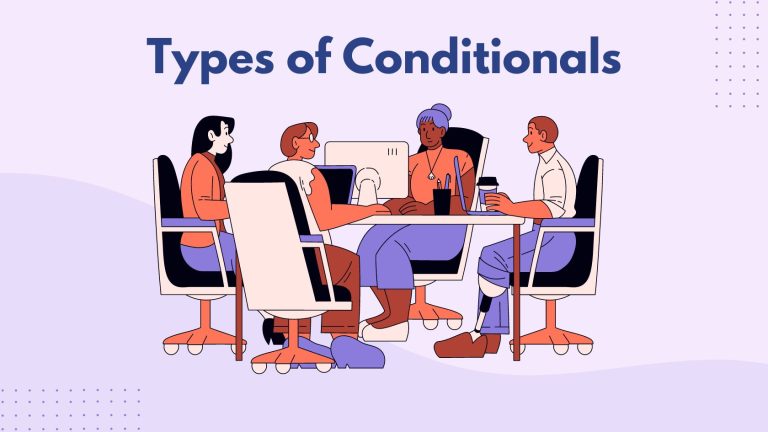Types of Conditional Sentences

Conditionals are sentences that use “if” situations and their possible outcomes. They usually have two parts: the “if” part (condition) and the result part (outcome).
We can use conditional sentences for real and imaginary conditions. For example, “If it rains, we will stay indoors” shows a real possibility. Whereas “If I were a bird, I would fly everywhere” is an unreal or imaginary condition.
We can divide them into 4 types:
Here’s a table that shows you the structure and examples of each type of conditional.
| Conditional Type | If Clause | Result Clause | Examples |
|---|---|---|---|
| Zero Conditional | If + present simple | will + base form | If you heat water to 100°C, it boils. |
| 1st Conditional | If + present simple | will + base form | If you study hard, you will pass the exam. |
| 2nd Conditional | If + past simple | would + base form | If I won the lottery, I would buy a big house. |
| 3rd Conditional | If + past perfect | would have + past participle | If they had invited us, we would have attended the party. |
Conditional sentences follow a structure that combines a condition clause (using “if”) with a result clause. Here’s a simple breakdown of the main types of conditional sentences
Each type has a different purpose, from stating facts to exploring past hypotheticals. Here’s a bit more information for each type of conditional type.
Zero Conditional Sentences
Zero conditionals are for general truths, facts, or situations where the outcome is always true. These sentences often reflect scientific facts, habitual actions, or universal truths.
We can form a zero conditional sentence by using “if” or “when”. This is followed by the present simple tense in both the condition and the result parts.
Structure: If + present simple + (result) + present simple
Use: General truths and facts
Example: “If you heat water to 100°C, it boils.”
This sentence states a general truth about water boiling at a specific temperature. It shows the cause-and-effect relationship that is always true under these conditions. That’s why zero conditional sentences are ideal for stating facts, rules, and instructions.
1st Conditional Sentences
First conditional sentences are for real and possible situations in the future. This conditional expresses a cause-and-effect relationship where the outcome is very likely.
We can form the first conditional by using “if” followed by the present simple tense. Then, we use “will” plus the base form of the verb in the main clause.
Structure: If + present simple + will + base form
Use: Real or likely future situations
Example: “If you study hard, you will pass the exam.”
This means that studying hard is a condition that, if met, leads to likely passing the exam. The first conditional is especially practical for making predictions.
2nd Conditional Sentences
Second conditional sentences are for hypothetical situations in the present or future. We often use them to express dreams, unlikely desires, or hypothetical scenarios that we don’t expect will ever happen.
We can form the second conditional by using “if” followed by the past simple tense for the condition. The main clause uses “would” followed by the base form of the verb to describe the hypothetical outcome.
Structure: If + past simple + would + base form
Use: Unreal or unlikely situations in the present or future
Example: “If I won the lottery, I would buy a big house.”
This sentence imagines a situation (winning the lottery) that is not necessarily expected to occur. But it also discusses what the speaker would do if it did. That’s why the second conditional is great for discussing dreams or theoretical plans.
3rd Conditional Sentences
Third conditional sentences are for past situations that didn’t happen and a hypothetical outcome. They express imaginary results of conditions that were not met in the past.
The third conditional uses “if” followed by the past perfect tense for the condition part. The main clause uses “would have” followed by the past participle form of the verb to describe the hypothetical outcome that did not happen.
Structure: If + past perfect + would have + past participle
Use: Unreal situations in the past
Example: “If they had invited us, we would have attended the party.”
This sentence reflects on a past scenario (not being invited to the party). Then, it imagines what would have happened (attending the party) if the conditions had been different. The third conditional is useful for contemplating how things could have turned out differently in the past.
Types of Conditional Sentences
Conditional sentences let us talk about “what if” situations. They range from real facts to pure imagination. We have four main types:
- Zero conditionals talk about things that are always true.
- First conditionals predict likely future events.
- Second conditionals imagine situations that aren’t likely to happen.
- Third conditionals think about how past situations could have been different.
Conditional sentences range from sure things to imagining possibilities. Remember each one to become a better communicator.
